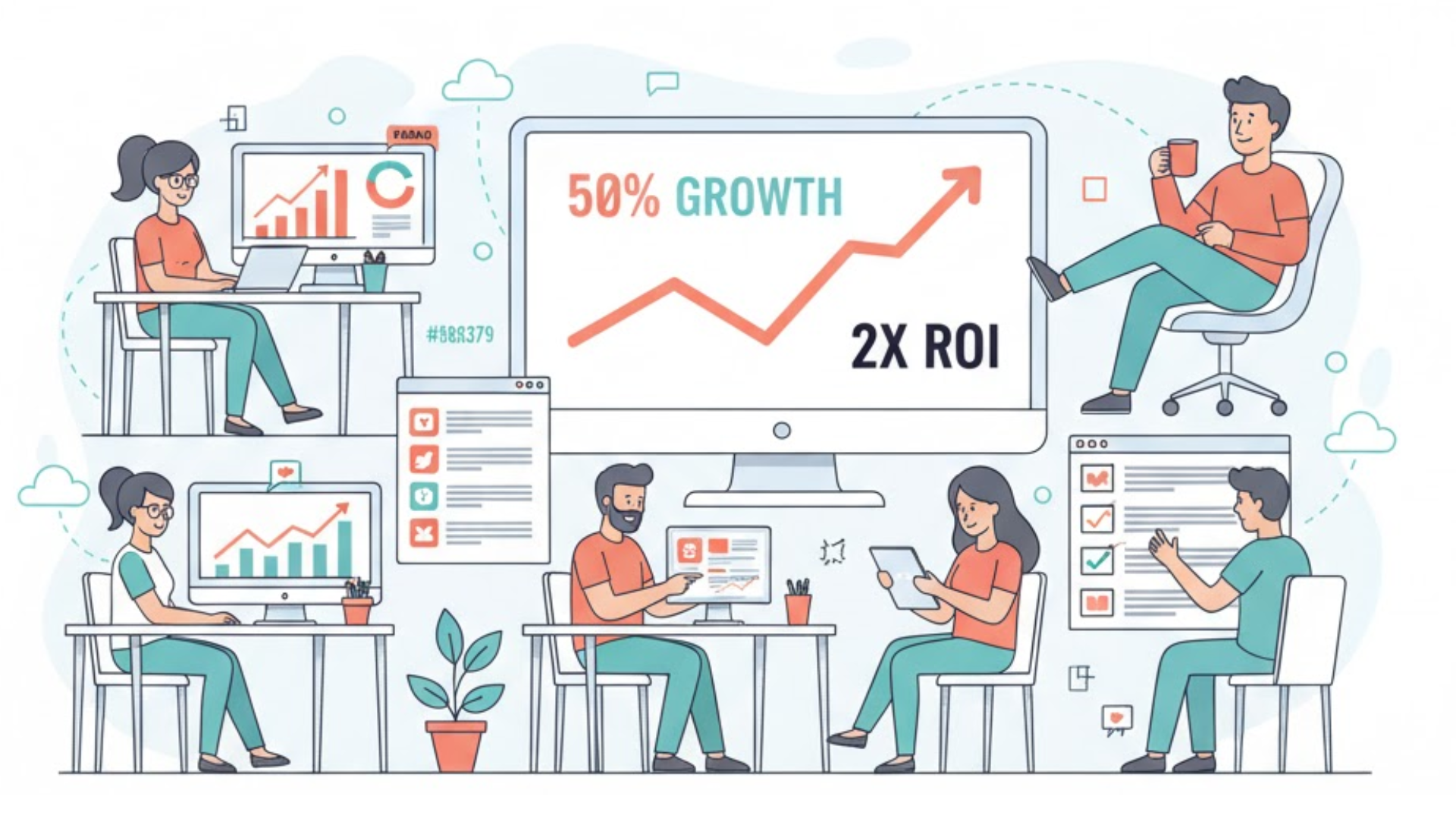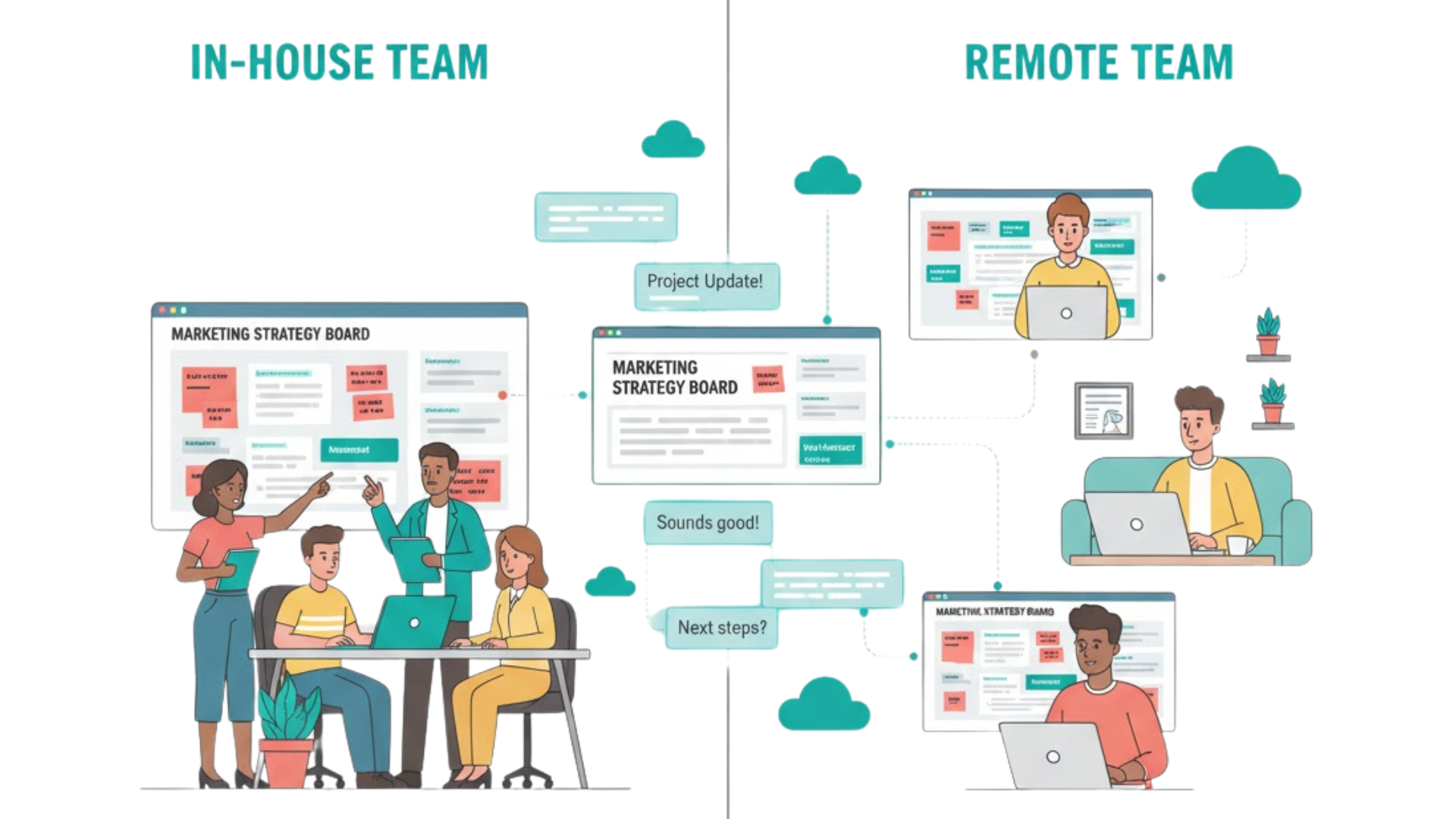In-House vs Outsourced Marketing: Which Approach Is Best?
Deciding between keeping marketing in-house and outsourcing it is a constant dilemma. Some believe that only an internal team can truly understand their brand, while others argue that outsourcing saves time, cost, and stress. The debate on in-house vs outsourcing marketing has intensified in recent years as businesses face tighter budgets and faster-moving digital trends. What makes the choice more complicated is that both approaches come with strong advantages and potential pitfalls.
Related Article: What Is the Difference Between Outsourcing and Offshoring?
DELEGATION ISN’T JUST A TASK—IT’S A STRATEGY.
Learn how to delegate with clarity and purpose so your team thrives and your business grows.
Why Outsource Your Marketing Team?
Outsourcing your marketing means hiring an external agency, consultant, or virtual team to handle all or part of your marketing functions. Many businesses choose this approach to gain access to specialized expertise, reduce overhead costs, and focus on their core operations. Below are the main reasons companies decide to outsource their marketing efforts.
Access to a Wide Range of Expertise
Outsourced marketing gives businesses access to professionals who specialize in specific areas such as SEO, paid ads, social media, and content creation. It’s difficult for a small internal team to cover all these areas effectively. By outsourcing, businesses can benefit from experienced marketers who stay up to date with the latest strategies and tools. These specialists know what works and what doesn’t, which can help businesses achieve faster, data-driven results.
Related Article: The Reality and Risks of Using AI for Content Creation: Facts!
Lower Operational Costs
Maintaining a full in-house team means paying salaries, benefits, and training expenses, not to mention the software and tools needed for marketing. Outsourcing often allows companies to access the same, if not higher, level of marketing talent at a lower cost. Instead of paying for multiple full-time employees, a business can contract a team for specific campaigns or ongoing support. This predictable and scalable cost structure makes budgeting easier. For many growing companies, this cost efficiency is what makes outsourcing more appealing than in-house marketing.
Flexibility and Scalability
Every business goes through busy and quiet seasons. Outsourcing allows for flexibility by scaling services up or down based on current needs. A company can quickly launch a new campaign without having to recruit and train new staff. Likewise, when things slow down, services can be reduced without any long-term commitments. This adaptability gives businesses more control over spending and performance, which is why many prefer the outsourced model in marketing.
Fresh and Objective Perspective
When you’ve worked on a brand for too long, it can be easy to lose perspective. Outsourced marketers come in with a fresh set of eyes and may spot opportunities that internal teams overlook. They can identify gaps in messaging, target audience, or campaign strategy that can make a big difference. Their external perspective helps avoid tunnel vision, especially in competitive industries. That outside insight is often a game-changer for companies deciding between in-house vs outsourcing marketing strategies.
Focus on Core Business Operations
By outsourcing marketing, business leaders can focus their energy on what they do best: managing operations, developing products, or improving customer service. Marketing can be time-consuming, especially when it involves analytics, ad management, and content production. Having professionals handle it externally lets business owners focus on growth instead of daily marketing tasks. Many entrepreneurs find peace of mind knowing experts are handling their campaigns while they concentrate on driving results internally.
In-House Marketing: The Pros and Cons
Running marketing internally has been a traditional model for many businesses. It means hiring a team of employees who are directly part of your company and responsible for all marketing activities. Let’s look at the main advantages and disadvantages of keeping marketing in-house.
Pros of In-House Marketing
Stronger Control and Brand Alignment
One of the biggest advantages of in-house marketing is control. Internal teams work closely with company leadership, ensuring campaigns fully align with the brand’s message, tone, and goals. Because they’re part of the organization, they understand the brand deeply. This familiarity helps maintain consistency across all marketing channels. For companies where brand voice is crucial, in-house marketing offers unmatched alignment.
Immediate Communication and Collaboration
Having an in-house team allows for instant feedback and collaboration. Quick meetings, immediate edits, and fast approvals become part of the daily routine. This real-time communication is ideal for businesses that move quickly or frequently adjust their messaging. It also helps prevent delays often experienced with external partners. The fast-paced coordination gives internal teams an edge in responsiveness when comparing in-house marketing vs outsourcing.
Deep Understanding of the Business
In-house marketers live and breathe the business every day. They know the customers, industry, and internal processes better than anyone else. This deep knowledge allows them to craft content and campaigns that truly reflect what the company stands for. It also makes it easier to connect with audiences on a personal level. When marketers fully understand their brand, their campaigns often feel more authentic.
Stronger Brand Consistency
Maintaining a consistent brand image is easier with an internal team. From the tone of voice to visual design, the in-house team ensures that every piece of content matches brand guidelines. Consistency strengthens customer trust and recognition, which are vital in competitive markets. Internal collaboration also helps unify sales, marketing, and customer service messaging. This cohesion can sometimes be harder to maintain in outsourced vs in-house marketing arrangements.
Higher Commitment and Accountability
Employees who are part of the company are often more invested in its long-term success. Their job performance directly affects the company’s growth, which can encourage stronger accountability. When goals are achieved, they celebrate as part of the business. This sense of ownership helps motivate them to push harder for better results. For many organizations, that level of dedication is what makes in-house teams appealing.
Cons of In-House Marketing
Higher Fixed Costs
Building and maintaining an internal marketing department requires significant investment. Salaries, benefits, and training all add up, along with marketing software and campaign expenses. These fixed costs can strain smaller companies or startups that need flexibility. Unlike outsourced services, these expenses remain constant regardless of workload. This cost factor often tips the balance toward outsourcing when comparing in-house vs outsourcing marketing.
Limited Expertise in Specialized Areas
Marketing covers a wide range of skills, from content strategy to digital advertising and analytics. It’s rare to find one team that excels in every area. Smaller businesses often have generalists instead of specialists, which can limit performance in complex campaigns. External partners usually have access to multiple experts, giving them an advantage.
Related Article: How Effective Is Facebook Advertising? Is It Still Worth It?
Scalability Challenges
When a business grows or needs to expand campaigns quickly, an in-house team may struggle to keep up. Hiring new staff takes time, and training delays can slow execution. Conversely, an outsourced team can scale faster to meet new demands. This makes it easier to adapt to seasonal or market changes. Limited scalability is one of the main drawbacks of in-house setups.
Risk of Creative Burnout
Working on the same brand every day can lead to creative fatigue. Over time, internal teams may find it harder to generate fresh ideas. Without external input or inspiration, campaigns may become repetitive. Outsourced agencies often bring new energy and innovative strategies to their projects. To stay fresh, in-house teams must actively seek inspiration and continuous learning.
Potential Inefficiency During Slow Periods
When marketing demands slow down, internal teams can become underutilized. However, businesses still need to pay their full salaries and overhead costs. Outsourced teams, on the other hand, can be paused or scaled down as needed. This flexibility makes external arrangements financially appealing. Companies with fluctuating marketing needs should consider this factor carefully.
Outsourced Marketing: The Pros and Cons
Outsourced marketing means partnering with external professionals to handle campaigns and strategy. It’s a popular choice among businesses that want to grow quickly without building an entire internal team.
Pros of Outsourced Marketing
Cost-Effectiveness
One of the strongest reasons to outsource marketing is cost control. Businesses can access a full team of professionals for the price of one or two in-house employees. There’s no need to pay benefits or invest in expensive tools. Most agencies offer packages that fit various budgets, making costs predictable and manageable. For many small businesses, this cost-efficiency makes outsourcing an easier choice vs in-house marketing.
Access to Cutting-Edge Technology
Marketing agencies invest in the latest software, analytics platforms, and automation tools to stay competitive. This means clients gain access to top technology without purchasing it themselves. These tools can significantly improve targeting, data tracking, and campaign results. Internal teams often lack these resources due to budget limits. Outsourcing bridges that gap effectively.
Greater Flexibility and Speed
Outsourced teams can adjust strategies or scale campaigns at a moment’s notice. When trends shift or opportunities arise, external marketers are equipped to respond quickly. They’re not tied to company bureaucracy or lengthy approval processes. This makes it easier to stay agile in fast-moving industries. Businesses that prioritize adaptability often lean toward in-house vs outsourcing marketing models that include external help.
Objective Evaluation of Performance
External marketers provide an unbiased view of how campaigns perform. Because they’re not part of the internal hierarchy, they can give honest feedback and recommendations. This helps businesses make informed decisions based on results, not assumptions. Transparency and accountability are central to most agencies’ operations. Having an outsider’s perspective helps improve strategy and ROI.
Access to Diverse Experience
Agencies work with clients across different industries, giving them a broad understanding of what works in various markets. This cross-industry experience can introduce fresh approaches that might not be obvious internally. Businesses benefit from tested strategies that have succeeded elsewhere. It’s one of the biggest strengths of outsourcing compared to keeping marketing entirely in-house.
Cons of Outsourced Marketing
Less Control Over Day-to-Day Work
When you outsource marketing, the external team operates independently. While they follow the agreed-upon strategy, daily decisions and creative choices may not always align perfectly with your expectations. Some businesses prefer closer control over every step. Maintaining consistent communication can help manage this issue effectively.
Onboarding Takes Time
External teams need time to learn about your brand, values, and audience before they can produce high-quality work. This onboarding period can delay initial campaigns. However, once they’re familiar with your business, efficiency improves significantly. Providing detailed brand guidelines and feedback early on minimizes these delays.
Communication Gaps Can Arise
Outsourcing often means coordinating across time zones, communication tools, or schedules. Misunderstandings may occur if instructions are unclear or delayed. Regular meetings and transparent updates are essential for success. Building a strong working relationship helps bridge communication gaps.
Risk of Lower Priority
Agencies juggle multiple clients, which may sometimes affect the level of focus on one account. To avoid this, businesses should choose an agency with a clear service agreement and defined KPIs. Frequent updates and regular check-ins help ensure attention remains consistent. Partnering with a reliable agency prevents this problem from escalating.
Potential for Hidden Costs
Some outsourcing contracts include additional charges for revisions, extra campaigns, or added services. Without clear expectations, these can lead to budget overruns. Reviewing agreements carefully before signing prevents unwanted surprises. Choosing an agency that values transparency helps maintain trust.
The Difference Between In-House VS Outsourced Marketing
The main difference between in-house vs outsourcing marketing lies in ownership, cost structure, and flexibility. In-house teams are part of your company, while outsourced teams are external partners. In-house marketing provides more control and cultural alignment, but it’s also more expensive and slower to scale. Outsourced marketing is flexible, cost-efficient, and offers diverse expertise, but it requires strong communication and management.
Companies often start with outsourcing, then bring certain roles in-house as they grow. Some adopt a hybrid model, using both approaches to balance control and flexibility. Understanding your business goals, budget, and marketing needs will help determine which structure fits best. There’s no one-size-fits-all solution, but clarity in strategy ensures long-term success.
Which Approach Is Best?
Choosing between in-house marketing vs outsourcing depends on several factors: company size, goals, resources, and timelines. Larger companies that require brand consistency and have higher budgets often keep marketing internal. Startups and small businesses that need fast results and lower overheads usually prefer outsourcing.
It’s also worth noting that combining both approaches can yield powerful results. For instance, an internal marketing manager may handle strategy, while an outsourced team executes specific campaigns. This hybrid model offers the best of both worlds, control and expertise. What matters most is aligning your marketing structure with your overall business direction.
Choose the Right Option for Your Business
Smart Virtual Assistants
👍🤵
Smart Virtual Assistants 👍🤵
In evaluating in-house vs outsourcing marketing, there’s no universal right answer. The decision depends on your goals, resources, and comfort level with delegation. If your company wants flexibility, lower costs, and access to diverse expertise, outsourcing may be your best move.
At Smart VAs, we help businesses manage their marketing efficiently by providing a team of virtual assistants specialists. Our team can handle content creation, social media management, and analytics, helping you focus on growth while we handle execution.
If you’re comparing outsource vs in-house marketing, let Smart VAs guide you toward a solution that meets your business goals seamlessly. Book a call now!
What if you could reclaim 40 hours this month?
Find out inside this free guide.
Frequently Asked Questions
-
Start by assessing your business goals, budget, and the complexity of your marketing needs. If you need a team that understands your brand deeply and can collaborate daily, an in-house setup may work better. If you’re after flexibility and cost control, outsourcing is ideal. The in-house vs outsourcing marketing question should always be answered through clear priorities and measurable goals.
-
Yes. Many businesses use a hybrid approach where an in-house team manages strategy while external experts handle execution. This setup balances control with cost efficiency. It’s especially helpful for growing companies that need both structure and scalability.
-
The main risks include communication gaps, hidden costs, and possible misalignment with brand identity. Choosing a trustworthy partner with transparent terms helps prevent these issues. Set clear expectations and monitor progress regularly to ensure alignment.
-
Success should be based on key metrics such as conversions, ROI, engagement, and overall growth. Compare how internal and external teams perform based on budget efficiency and campaign outcomes. Reviewing analytics regularly will help identify which model delivers stronger results.
-
For small businesses, outsourcing is often the more practical choice. It offers professional marketing services at a fraction of the cost of maintaining a full team. However, as the business grows, building a small in-house department can add more consistency and control. Balancing both can bring long-term benefits.
Ready to Work Smarter, Not Harder?
Smart VAs provides a team of highly skilled specialists from around the world, ensuring seamless support no matter the time zone. We take pride in delivering efficient, fast, and high-quality service so you can focus on growing your business. With one subscription plan, you gain access to a complete team of digital marketing experts that’s customized to your unique needs, eliminating the need to train and look for one yourself!






